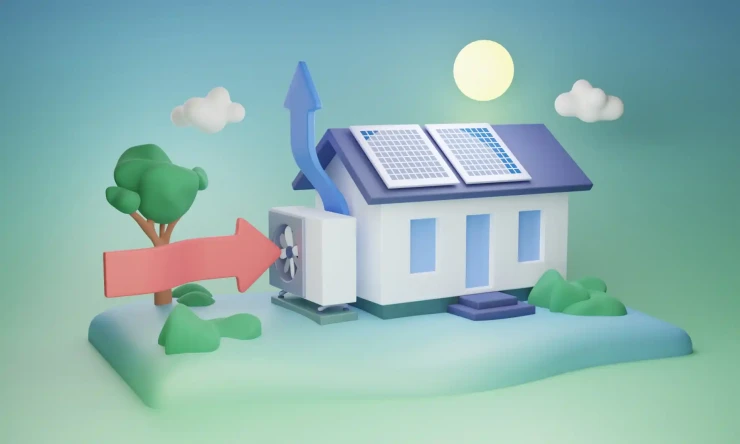UK households are racing to install roof-top solar panels as energy prices continue to rise. The soaring price of electricity means that a domestic solar panels system can now pay for itself in as little as seven years and the payback period could be even less if energy prices continue to go up in the following months as predicted.
The energy price cap will jump again in October by 80% to take the average bill to £3,549 caused by a rebound in global demand and the war in Ukraine squeezing gas supplies.
Only a year ago solar panel installers were saying that the payback period was 15 years or more, but all this has changed. Industry data shows that solar panel installation in households rose to a seven-year high in the first six months of this year with literally thousands of families looking at ways they can reduce their reliance on the electricity grid and cut their energy bills.
Installers are saying that demand has exploded with the impacts of the fossil fuel crisis. Solar companies are being overrun with enquiries for new installations in a bid to beat spiralling energy prices.
Data from Solar Media Ltd shows that there was more solar capacity fitted to residential rooftops in the first six months of this year than all of 2021. According to MCS, a government-backed accreditation body, 43,400 solar panels were installed from January to May which is more than twice the 21,400 over the same period in 2021. In May, the number of installations rose to a record high of 10,869 which is the highest since 2015. Between January and June this year 164MW of new capacity was installed on the roofs of UK homes, compared to 153MW over the whole of 2021.
Solar Media Ltd. said that Ground-mounted solar and commercial installations are also growing though not as quickly as residential installations.
COMPARE PRICES FROM LOCAL INSTALLERS
Compare prices from local companies fast & free
Enter your postcode to compare quotes from leading professionals. We promise to keep your information Safe & Secure. Privacy Policy
Ian Rippin, chief executive of MCS, said:
“Solar-powered energy has never been brighter.”
Unfortunately, the increase in demand may mean that you won’t be able to have a solar system installed this side of winter by your first choice of company. On top of this there are supply problems as about 90% of panels are made in China. Some installers are warning customers that there could be delays of 10 months or more.
Six months ago, the main problem was the lack of skilled labour, but the biggest problem now is the global shortage of stock. Panel manufacturers are saying that they have sold as much in the first quarter of 2022 as they did for the whole of last year.
The benefits of having solar panels have never been more attractive. The price of an average solar panel system for a domestic home is around £6,000 but because the cost of energy is so high homeowners can see the investment pay for itself faster than ever.
The cost of installing solar panels will depend on the size of the system required, the battery, which is optional and can double the price, the diverter (to feed electricity to your immersion water heater) and whether you decide to install an electric vehicle charger at the same time. “Premium” panels and batteries such as Tesla’s will of course cost you more.
Based on estimates from Energy Saving Trust, a typical household with a 4.2 kilowatt-peak system could save £400 based on current energy prices though this saving is set to increase in the coming weeks. Further savings of approximately £122 can be made by selling excess power to the National Grid. However, some households are being paid as little as 1.5p per kWh for energy which is then sold on at 28p per kWh.
The trade body Solar Energy UK has suggested that the average household could save as much as around £500-£600 from their annual electricity costs if they install rooftop solar panels.
A 4kW solar panel system suitable for the average home should generate about 3,500kWh (kilowatt hours) of electricity a year across most of England. With the average 28p unit price of electricity a kWh means the 3,500kWh produced is worth £980. In which case, if you paid say £7,000 for an installation, it will pay for itself in seven years.
Installing solar panels can go a long way towards helping householders to reduce their energy bills. A typical bungalow or detached home in the UK uses about 4,100 kWh a year, so panels producing 3,500 kWh a year will cover much of a household’s usage.
Homeowners will need to change their electricity usage habits to make the most of their panels. For example, appliances such as the dishwasher should be run during the day and not at night.
One worthwhile option for homeowners is to install a diverter which can send any excess energy generated by their solar panels to an immersion heater. Installers are saying that this is now a better option than having separate solar hot water panels. They cost about £500.
Another way of being less reliant on the National Grid is to purchase a battery. On a sunny day, many households will struggle to even use half of the electricity generated by the panels. A battery can store the energy that a household doesn’t use in the day for night-time use. Unfortunately, batteries are very expensive and can almost double the cost of a solar panel installation.
Homeowners can save money by selling their excess electricity back to the Grid via the Smart Export Guarantee. The big electricity companies set their own SEG rate and most pay just a few pence. Octopus Energy offers the best rate at 7.5p per kWh with the next best rate at only 5p per kWh.
The energy price cap for October has now been announced which will see the 28p unit price leap to 45p or more. This means that the value of electricity produced by a 4kW system will rise to £1,575 or more which would suggest that solar panels could pay for themselves in five years!
Homeowners need to bear in mind that electricity unit prices could fall back while the cost of panels and installation are likely to rise, possibly by a lot so there are no guarantees.
The time to act is now if homeowners can find a good installer that has the time to do the work for them.
With the present trajectory, analysts predict that April 2023 could see the average energy bill hit £5,277 which would slash the payback period for solar panel installations to just 4.1 years.
Dr Simon Evans, senior policy editor at Carbon Brief said:
“Stratospheric gas prices are driving our energy bills through the roof. That’s making low-carbon options even more cost effective. Whether it’s large-scale windfarms now costing four times less than gas power, or home solar systems that could pay back the initial outlay within less than five years, the economic case for net-zero has never been stronger.”
As energy costs rise households with rooftop solar will save more money each month, reducing the length of time it takes to pay off the initial outlay for the system.
The more homeowners can use their own electricity rather than selling it back to the grid the faster the payback period will be.
If a homeowner can afford the initial outlay, solar PV is a great way to deal with the soaring energy prices and cost of living.





























